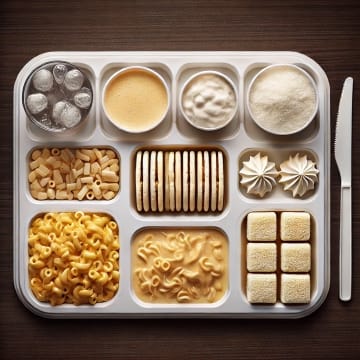The Plastic Population: Teaspoon in Your Brain
21 March 2025 at 11:04
The Plastic Population: Teaspoon in Your Brain
Did you know...Your brain might contain enough plastic to make a teaspoon?
Microplastics have become widespread in the environment, infiltrating our food supply and raising concerns about health. Recent research has shown that these tiny particles are gradually accumulating in human tissue - including the brain. Let’s take a closer look at the research and the health impacts, then explore how we can minimise the risks.
Research on microplastics in the brain
A recent study published in Nature Medicine (2025) found that levels of microplastics in the brain are gradually increasing, with average levels rising by a staggering 46% in the past 8 years. Gram for gram, the amount of plastic in an average human brain was calculated to be equivalent of a plastic teaspoon. And it’s rising.
The brain is particularly susceptible to plastic accumulation due to its fatty nature and the lack of detoxifying mechanisms that are found in other organs (like the liver and kidneys, which are partly able to eliminate plastics from the body). It may be no surprise that individuals diagnosed with dementia had more than five times the amount of microplastic in their brain tissue compared to those without the condition.
Health Impacts of Microplastics
As well as the risk of neurological conditions like dementia, microplastics have been linked to a number of other health issues. Research from the University of York showed that high levels of microplastics can harm human cells, leading to inflammation, allergies and a weaker immune system. Chemicals used in plastics, such as BPA, can interfere with hormonal functions, potentially leading to reproductive issues and metabolic disorders like type 2 diabetes.
It’s clear that we need to reduce microplastic exposure without delay. But how can we do this? First, we need to understand how microplastics enter our food:
How Microplastics enter the Food Chain
Fish and Shellfish: Oceans are heavily polluted with plastic waste, causing marine organisms to ingest microplastics. Fish and shellfish then consume these organisms, transferring the plastic to humans when we eat them.
Agricultural Practices: The use of plastic products in agriculture can introduce microplastics into soil and water. These particles can then be absorbed by crops, which end up on our plates.
Food Packaging: Plastic packaging is abundant in the food industry. During processing, storage, and heating, microplastics and associated chemicals can leach into food.
Airborne Particles: Microplastics present in the air can settle on food during processing and packaging. They can even settle on food in the home.
Microwave Heating: Using plastic containers or pouches in microwaves can cause microplastics and chemicals to leach into food.
Bottled Water: Studies have detected microplastics in bottled water, likely originating from the packaging. Frequent consumption can contribute to the accumulation of microplastics in the body.
Plastic Utensils and Containers: Regular use of plastic utensils and containers can lead to microplastic ingestion, especially when there is wear and tear to the utensils.
Reducing Microplastic exposure
Following a naturopathic lifestyle can minimise the risk of microplastic contamination from agricultural practices and packaging. The naturopathic approach emphasises whole, natural foods, clean water, and sustainable living practices with a diet rich in organic, unprocessed foods. Supporting the body's detoxification processes with nutrient-dense foods, herbs, and adequate hydration further mitigate the harmful effects of microplastics. Additionally, adopting natural, eco-friendly alternatives for cleaning, cooking, and personal care can reduce reliance on plastic products, contributing to a healthier environment and reduced plastic exposure.
Here are some useful tips to help minimise your risk of microplastic accumulation
- Use glass, stainless steel or ceramic containers for food storage
- Choose wood or metal utensils for cooking
- Avoid heating plastics, by transferring microwavable food from tubs and pouches into glass or ceramic dishes
- Choose fresh, unpackaged foods over processed foods
- Switch from bottled water to filtered water
- Reduce consumption of large predatory fish like tuna, as they are higher up the food chain and therefore more prone to high levels of microplastics
- Limit seafood which has been shown to be high in microplastics such as shrimp, prawns, mussels, and oysters.
- Consider a consultation with a naturopathic nutritional therapist, to ensure your organs of detoxification are working optimally and your tissues are as healthy and resilient as possible.
If you’d like to learn more about natural health, consider one of The School of Health’s online courses in Homeopathy, Herbs, Nutrition or Naturopathy.









.png)
